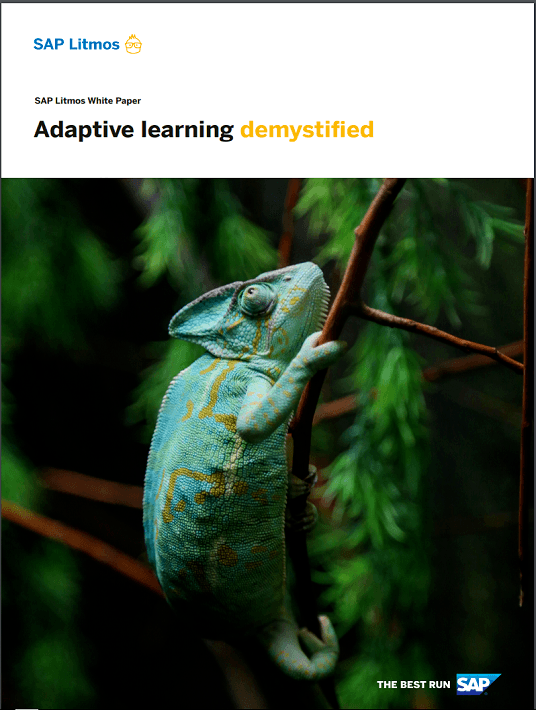Your Guide To The Perplexing World Of Adaptive Learning
In this eBook about adaptive learning, SAP Litmos manages to handle a hard and challenging subject in an effortless and efficient way. But how did this term come to be? Adaptive learning is a term much older than most people think. This holds true for learning technologies in general as well. For example, there was a very simple machine able to both "teach" and "test" back in the 1920s, made by Sidney Pressey, that would reward the learner with a piece of candy if they answered correctly. However, adaptive learning as we understand it today was created in the 1950s by B. F. Skinner who believed that, with the aid of teaching machines, a learner could double their progress with the same amount of effort as in Instructor-Led Training since they would be able to move at their own pace and move on to a new subject only if they had mastered all the required material first.

The trend began its rise to popularity starting in the early 1970s, quickly finding its place within the Artificial Intelligence movement. The field of computer science was booming, and the notion of computer-assisted instruction became a very popular one. This is where the notion of guiding each learner differently according to their evaluation began to take shape. Unfortunately, the progress of adaptive learning would have to halt for some time until the size of computers would become more practical and their cost would cease to be so foreboding. In the present, however, these barriers have been torn down and adaptive learning is widely applied, even outside education. NASA uses it for simulations, and even Amazon and Netflix have adaptive learning elements on their respective platforms to identify and adapt to users' preferences.
About The eBook
What Value Does Adaptive Learning Offer Organizations?
The eBook begins by introducing us to the many benefits of adaptive learning and focuses on how these can fit a workplace that is changing dramatically. Using the exact same content with all the members of your organization is no longer considered good practice. Adaptive learning offers a much more tailored experience, it is able to scale inexpensively, and it retains most, if not all, of the benefits of one-on-one mentoring.
What Is Adaptive Learning?
The next chapter goes into an analysis of what adaptive learning is. There is a breakdown of how and why this is a tailored experience, with a big emphasis on how this is an efficient form of learning that delivers results.
The Next Chapter In eLearning
The following section of the eBook discusses how adaptive learning will be the next chapter in eLearning. There are many features of adaptive learning that fit the needs of today, for example, its ability to adapt content and delivery to the learner, and how this leads to the highly sought after tailored, individualized learning everyone is looking for.
Flexible, Online Learning
Flexibility is one of the main selling points for adaptive learning. Adaptive learning works best when it takes into account our lifestyle, work habits, and the world around us. It is characterized by its responsive design, bite-sized content, scenario-based assessment procedures, immersive content, a plethora of rich media, and regular learning checks.
Why Does Adaptive Learning Suit Modern Workers?
There are many characteristics of adaptive learning that fit the profile of the modern worker. The advantages of adaptive learning in a corporate environment include bite-sized content that is mixed and matched, adaptive pacing, and a natural and pleasant User Experience.
Explore The World Of Adaptive Learning
Adaptive learning has reached a state far superior to anything it had been in the past. It understands how to optimize learning by personalizing the experience for every learner, creating engagement, and promoting critical thinking. If you want to experience the world of adaptive learning and see the countless possibilities that it holds, make sure to download the SAP Litmos eBook "Adaptive Learning Demystified" for a thorough explanation of adaptive learning.







